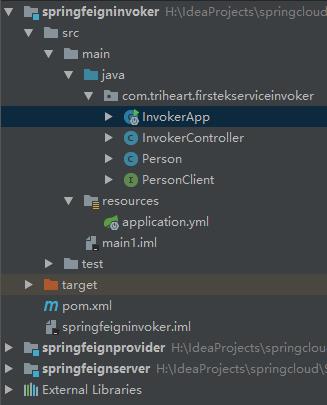08 在Spring Cloud中使用Feign
Posted 小小浪花儿
tags:
篇首语:本文由小常识网(cha138.com)小编为大家整理,主要介绍了08 在Spring Cloud中使用Feign相关的知识,希望对你有一定的参考价值。
Spring Cloud对Feign进行了封装,本例将演示如何在Spring Cloud中使用Feign。
1.准备SpringCloud的测试项目
测试项目主要有三个,
a.spring-feign-server: Eureka的服务器项目,端口为8761;
b.spring-feign-provider: 服务提供者,该项目通过在控制台输入对应的端口号启动两个实例,分别是8080和8081端口的实例,这两个实例提供如下服务
第一个地址为person/{personId}的服务,请求后返回Person实例,Person的message属性请求的是URL。
c.spring-feign-invoker: 服务调用者,该项目对外端口是9000,本例主要是在该项目下使用Feign。
由于Eureka服务器项目以及服务提供者项目不是本文的重点,此处不做详细介绍,详情可参考前面的博文。本文将重点介绍服务调用者项目,项目的目录结构如下

2.Spring Cloud中整合Feign
在服务调用者(spring-feign-invoker)的pom.xml文件中引入相关依赖,代码清单如下
pom.xml

<?xml version="1.0" encoding="UTF-8"?> <project xmlns="http://maven.apache.org/POM/4.0.0" xmlns:xsi="http://www.w3.org/2001/XMLSchema-instance" xsi:schemaLocation="http://maven.apache.org/POM/4.0.0 http://maven.apache.org/xsd/maven-4.0.0.xsd"> <modelVersion>4.0.0</modelVersion> <groupId>com.triheart</groupId> <artifactId>springfeigninvoker</artifactId> <version>1.0-SNAPSHOT</version> <dependencyManagement> <dependencies> <dependency> <groupId>org.springframework.cloud</groupId> <artifactId>spring-cloud-dependencies</artifactId> <version>Dalston.SR1</version> <type>pom</type> <scope>import</scope> </dependency> </dependencies> </dependencyManagement> <dependencies> <dependency> <groupId>org.springframework.cloud</groupId> <artifactId>spring-cloud-starter-config</artifactId> </dependency> <dependency> <groupId>org.springframework.cloud</groupId> <artifactId>spring-cloud-starter-eureka</artifactId> </dependency> <dependency> <groupId>org.springframework.cloud</groupId> <artifactId>spring-cloud-starter-ribbon</artifactId> </dependency> <dependency> <groupId>org.springframework.cloud</groupId> <artifactId>spring-cloud-starter-feign</artifactId> </dependency> <dependency> <groupId>org.projectlombok</groupId> <artifactId>lombok</artifactId> <version>1.16.18</version> </dependency> </dependencies> </project>
在服务调用者启动类中打开Feign开关,代码清单如下
InvokerApp.java
package com.triheart.firstekserviceinvoker; import org.springframework.boot.autoconfigure.SpringBootApplication; import org.springframework.boot.builder.SpringApplicationBuilder; import org.springframework.cloud.client.discovery.EnableDiscoveryClient; import org.springframework.cloud.netflix.feign.EnableFeignClients; /** * @author 阿遠 * Date: 2018/8/23 * Time: 17:51 */ @SpringBootApplication @EnableDiscoveryClient @EnableFeignClients public class InvokerApp { public static void main(String[] args) { new SpringApplicationBuilder(InvokerApp.class).run(args); } }
接下来,编写客户端接口,与单独直接使用Feign类似,代码清单如下
PersonClient.java
package com.triheart.firstekserviceinvoker; import org.springframework.cloud.netflix.feign.FeignClient; import org.springframework.web.bind.annotation.PathVariable; import org.springframework.web.bind.annotation.RequestMapping; import org.springframework.web.bind.annotation.RequestMethod; /** * @author 阿遠 * Date: 2018/8/29 * Time: 9:46 */ @FeignClient("spring-feign-provider") //调用服务提供者的服务名称 public interface PersonClient { @RequestMapping(method = RequestMethod.GET, value = "/hello") String hello(); }
与单独使用Feign不同的是,接口使用了@FeignClient注解来修饰,并且声明了需要调用的服务名称。另外接口方法使用了@RequestMapping来修饰,这是因为Feign的“翻译器”的功能可以让Feign知道第三方注解的含义,Spring Cloud也提供翻译器,将@RequestMapping注解的含义告知Feign,因此我们的服务接口就可以直接使用该注解。除了该注解外,默认还支持@RequestParam、@RequestHeader、@PathVariable这三个参数注解。需要注意的是,使用Spring Cloud的“翻译器”后,将不能再使用Feign的默认注解。接下来,在控制器中调用接口方法,代码清单如下
package com.triheart.firstekserviceinvoker; import org.springframework.beans.factory.annotation.Autowired; import org.springframework.context.annotation.Configuration; import org.springframework.web.bind.annotation.RequestMapping; import org.springframework.web.bind.annotation.RequestMethod; import org.springframework.web.bind.annotation.RestController; /** * @author 阿遠 * Date: 2018/8/23 * Time: 17:56 */ @RestController @Configuration public class InvokerController { @Autowired private PersonClient personClient; @RequestMapping(value = "/invokeHello", method = RequestMethod.GET) public String invokeHello() { return personClient.hello(); } }
在控制器在中,注入了PersonClient的Bean,不难看出,客户端实例的创建及维护,Spring容器都帮我们实现了。
启动Eureka服务器。
启动两个服务提供者,分别在8080和8081端口启动。
启动服务调用者,端口为9000。
在浏览器中输入http://localhost:9000/invokeHello,我们可以看到,服务提供者的/hello服务已经被调用。

3.Feign负载均衡
我们知道,如果结合Ribbon的使用,Spring Cloud的客户端就会拥有负载均衡的功能,因此,Spring Cloud实现的Feign客户端也拥有负载均衡的功能。下面我们测试其负载均衡功能
在PersonClient .java接口中添加如下代码
@RequestMapping(method = RequestMethod.GET, value = "/person/{personId}")
Person getPerson(@PathVariable("personId") Integer personId);
在InvokerController.java中添加如下代码
@RequestMapping(value = "/router", method = RequestMethod.GET, produces = MediaType.APPLICATION_JSON_VALUE) public String router() { // 调用服务提供者的接口 Person p = personClient.getPerson(2); return p.getMessage();
重新启动服务调用者,在浏览器中输入http://localhost:9000/router,刷新,可以看到8080与8081端口被循环调用。


以上是关于08 在Spring Cloud中使用Feign的主要内容,如果未能解决你的问题,请参考以下文章
